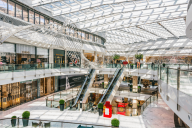The report supports the claim that “At least 40 per cent of businesses will die over the next ten years if they do not change their entire companies to accommodate new technologies”, according to John Chambers, Chairman of Cisco Systems.
Raouf explains, “Experiential retail will flow from online to offline and back again, creating a continuous loop of reinvention connecting many worlds, some of which may not be relevant to retail at all.”

Digital innovation will shape the future of shopping within the built environment.
The customer journey and experience within the mall will become smarter and more targeted to the individual requirements of consumers.
It will also provide developers and brands with deep insights that will be used to help them improve the efficiency of their operations.
“With the advancement of technology and data analytics science a new pillar of retail planning, design and operations has emerged. This gives us the capabilities to collect crucial data via multiple devices and channels, enabling us to make predictions and implement at speed and scale. This will create economic value, increase business performance and efficiency, differentiate product offerings, and more importantly enhance the customer experience”, he added.
As technology continues to evolve quicker than we can comprehend, companies are becoming more focused on the digital landscape. The top performing firms are looking to upscale when it comes to the quality of their systems and usage of artificial intelligence, with 54 percent of these companies looking to invest more in sensors during 2017 alone.
“When we talk about how the world is changing due to technological advances we are referring to the digital connection of communities and the revolution of total industries to improve productivity and efficiency.”
But one of the most interesting insights from the report explains how digital and the built environment will come together to create much more than just a place to shop. The retail mix is rapidly changing and in the future malls will become places we can walk to, work in, eat in, learn in, socialise in and much, much more. The malls of tomorrow will become the new heart of smart cities, towns and communities no matter how big or small.
Raouf explained, “We are seeing a huge shift in the behavior of consumers and what they want and expect from their experience. They are looking for more authentic experiences and more meaningful ways to interact with their favourite brands and hear about new ones”.
The next generation of shoppers are looking for lifestyle centres, places that successfully fuse together all aspects of living into one place. These young, diverse and urban consumers want to interact with the very latest products and technologies through WOW experiences that push the boundaries to the limit. Futuristic malls will incorporate the latest trends in shopping with digital advances to make the consumer experience something extraordinary.
“With the wealth of big data, the real estate and retail of the future should be first and foremost data driven, fully integrated and connected on all levels. The mall of the future is a SMART mall”, he concluded.
So, as this area of real estate development becomes more and more topical among developers, malls, retailers and brands, the message here is clear. Digital and brick and mortar will no longer live separately, but will feed off one another. Together they will create a united, more progressive model with the focus on how each can evolve and positively influence the change in the other.










